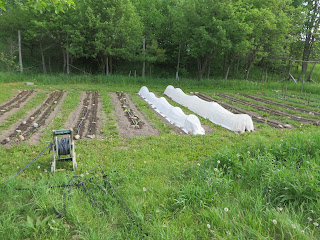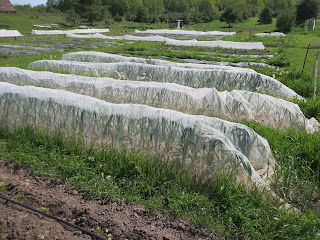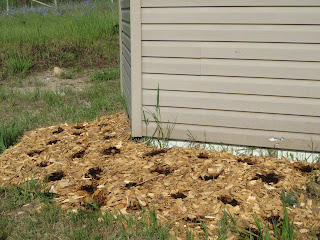Pepper plants for sale!!!
We have peppers, too many for our own use. If you lost some plants to frost, or don't want the typical bell peppers that the department stores dish out, then contact us. Please note that some varieties are limited, so call soon. I'll add a photo of our plants as soon as the camera battery is re-charged...
If you are a CSA customer, you can expect to find some of these in your harvest shares this season.
Here is what we have:
King of the North is a standard green to red sweet bell pepper that was developed in the thirties for the short, continental seasons (cool spring and autumn, hot summer). 60 days green, 85 days red.
Abay is a hybrid sourced from High Mowing seeds. 85 days green, 95 yellow. Large thick walled fruits adaptable to many growing conditions. A new one for our farm.
Olympus is another standard green (65 days) to red (85 days) sweet pepper. Potential for high yield. Tolerant to hot weather.
Carmen is a sweet Italian frying pepper. 60 days green, 80 days red and very sweet when fully rippened. First time we have tried this type of peppers.
Milena is a standard bell that goes from green (60 days) to orange (80 days). I was looking for a color other than red and settled on this one.
Two CSA shares left - contact us soon if you want some farm fresh produce that is organically grown on a real farm that is part of your community.
An added bonus - beat inflation! Buy your share now and insulate yourself from the grocers prices.
Lots to catch up on after a very intense period of time here at the farm.
Little time for rest, as there is a lot of watching of birds, mice, and farmers to be done.
Cayley is defintiely slowing down due to arthritis spreading to her knee, though she managed to bring home two mice in the past week.
I'll start by going back a couple of days, when frost mitigation was the primary task in the field.
During the warm spell prior to the frost, I transplanted a third of our peppers and onions, and the chard and celery seedlings. I knew that the weather was still unsettled but had no choice as the nursery was getting too crowded. I also sowed beets, spinach, and peas. I had to start these early as the peas and spinach needed the cool temperatures to thrive and that June was likely to be very hot.
Some days, partcularly before the coldest nights, I opened up the covers to allow sunlight to heat up the ground, and to assist seed germination.
Our heavy muck soil is slow to warm but when it does, it holds it's heat. I also watered regularly as moist soil is a better thermal mass than dry soil.
Beds that were empty were also covered with IRT mulch to save moisture from evaporation. I had some beans started part way through the frosty period as well, and used the IRT to keep the soil warm enough for germination. (Beans can germinate without sunlight).
As the covers come off, I found the fruits of my labour. Most plants survived, with only a loss of two out of fifty pepper plants. I had some in reserve, so we won't notice the difference.
One celery also failed, though it may have been for lack of moisture as my irrigation system is not perfect.
As soon as the covers were off the frost protected plants, I continued transplanting: the remaining third of the peppers and onions, and the lettuce and celeriac.
These are lightly covered for a day or two to provide some shade, which helps them transition to their new living space. It also helps conserve ground moisture now that evaporation is a big concern.
Recall the photo above with the peas? They are doing just fine. The cold might have helped somewhat, though I protected them anyway as they need some warmth to continue growing.
I'm now getting the stakes in to start trellising the plants.
Not just the peas doing well, the garlic is continuing to grow.
I'm not doing all the work right now, some of our past efforts are also starting to bear fruit. Our wild flower meadow is covered in blue flowers which I think is flax.
This will be very helpful for our bees, as these plants are flowering just as the first round of dandelions are closing up to set seed. We hope to add more flowers to this field over the next few years.
June is a difficult time for honey bees as the number of wildflowers in bloom decreases for a period of time.
One of our two pear trees succumbed to the winter; the other (see photo) has put forth some leaves at it's base.
The three electric fence stakes were used to support the burlap cover over the winter.
Our intention is to stat a few more fruit trees over the next few years - cherry trees are high on my wish list.
Julia has been busy in her spare time with plantng flowers: Sunflowers by the hexagon being one example. Bees, chickadees, and other predatory and pollinating insects also enjoy these.
She also has the cardoons out now, which are among the favourite of plants for bees.
Lettuces are doing well so far, in spite of the heat. I supply them with a little irrigated water, though unlike most vegetable crops, lettuce prefers to have wet leaves (makes the leaves softer after harvest).
I discovered at the old farm that relying on the irrigation for lettuce tends to cause rot at the base of the plant.
Here is a good example of progress at the farm.
These first tomato beds were being prepared during the frosty period, judging by the number of row covers in the field.
I am putting spare grass clippings into the beds to add extra organic material to loosen the soil and help retain moisture.
As soon as the frost was gone, the first tomato transplants were in the ground, with loosly applied covers to provide shade and moisture retention as the plants recover from transplant stress.
Yesterday, I put in the next third of tomato plants, and removed the covers from the first transplants. Just one more 25 foot bed (to the right) to clean up and plant tomatoes into.
We have one new tomato addition this year, a variety called Sergeant Pepper. This is a long season tomato (it takes about 20 days more than our other varieties to mature) so I ordinarily would not try it. However it came as a gift from our farm friend Hillary at Maple Lane Farm.
We had one of our bee hives swarm and as we did not want another hive (six are more than enough), we called her and asked if she wanted it to replace some of her winter hive losses.
She was quite eager to have another hive, so Julia caught the swarm and got it into a bee box, and Hillary arrived that evening with some free herb transplants, a black hot pepper plant, and this interesting tomato to add to this years crop.
One final note:
We want to remember one of our farm colleagues, Janet Ellenberger.
I called Henry Ellenberger a few weeks ago to arrange for our annual seed potato pick-up in Coe Hill, and was stunned to learn that Janet had passed away in April after a short illness.
I learned while speaking with Henry that Janet worked off farm as a social worker. Her warm, open, you-can-tell-me-anything smile matched that experience. She was the farm gardner for most of their vegetable crops, helped with the potato growing and grading, and aside from an instagram account, limited the internet use at the farm to one day a week - a real sign of sanity in my opinion.
Aside from that, we did not know Janet very well (she was often working off farm whenever I was up there), though there were a few times when we crossed paths. In particular, we recall the time they invited us in for a lunch snack of baked potato (naturally) and sour cream, augmented by some of Janet's home made cheese.
I phoned them after hearing that their area was particularly affected by the deracho, and she calmly related their terrifying experience.
When we made our trip up there on the 13th, Henry seemed in good spirits, showing us the damage from the deracho and explaining how their church group and nieghbours helped with the clean-up.
He says that their is a young couple just starting their farm a few miles away who have also been helping out this year with the potato growing: learning the grading, planting, and maintainance chores that Janet used to do.
We left feeling confident that Henry was surrounded by a caring community and keeping himself well.
Thank-you Janet for your part supplying us with seed tubers from the only organic seed potato farm in Ontario.















